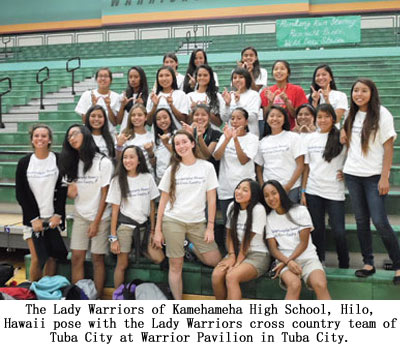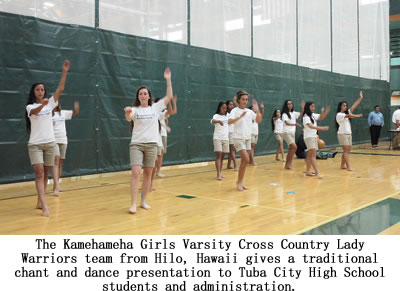 |
Canku Ota
|
 |
|
(Many Paths)
|
||
|
An Online Newsletter
Celebrating Native America
|
||
|
December 2014 - Volume
12 Number 12
January 2015 - Volume 13 Number 1 |
||
|
|
||
|
Cross Country Teams
Share Culture And Love Of Running At Tuba City High
|
||
|
by Rosanda Suetopka
- Navajo-Hopi Observer
|
||
|
credits: (all photos
by Rosanda Suetopka - Navajo-Hopi Observer)
|
TUBA CITY, Ariz. - It all started when Kamehameha High School Girls Cross Country Head Coach Joel Truesdell watched a 2002 movie by independent film-maker C.P. Goheen called "Lady Warriors" about the Tuba City High Girls Cross Country team who won four consecutive Arizona State Championship cross country titles. Truesdell watched the documentary at two Hawaiian island high schools, Oahu and Hilo, and though he said that both high school audiences were deeply moved, even to tears in some cases, that it was really the Lady Warriors of Kamehameha High whom the film deeply resonated with. "That film just showed our Hawaiian girls cross country team that they could truly have one foot in the western world and one foot in their cultural world and be a total super success. Our cross country team was so deeply inspired by the Lady Warriors of Tuba City High," Truesdell said. Truesdell, and his wife Elisabeth, came to the mainland in 2009 and 2010 to visit some of the colleges in the Southwest that might be appropriate for their Hawaiian students to attend. They drove to Sedona to stay over night. On a whim they decided to try to connect with the cross country coaches in Tuba City. So after they visited Northern Arizona University in Flagstaff, they made a call to Tuba City High and talked to the athletic director and the cross country coaches who invited them to come up to Tuba City for a visit. The Truesdells were shown around Tuba City High School, the townships of both Upper and Lower Moencopi Hopi Villages and the western agency portion of the town of Tuba. They were shown the arduous cross country sandy training hills called "TC Hill" and the Moencopi "Sand Hill." "We don't have anything like these two steep, sandy, rocky hills for our cross country team to train on in Hawaii," Truesdell said. "Now, I do have them run through what is called "Volcano" Hawaii, which is literally a live and dead volcano bedded area which is really near our high school in Hilo. I also have them run several big hills and on beach sand in Hilo to train." Truesdell also explained that Kamehameha High incorporates what Tuba City Unified School District is also practicing within all their schools - putting tribal language and culture first in all of their daily curriculum programs. "Tribal education and tribal language and culture have shown enormous success in all the Hawaiian schools that incorporate these skills in their everyday education programs," he said. "We have seen the rise in test scores and student achievement, self-esteem by having their Hawaiian culture play an everyday part of their academic pursuits. I am certain this is the case with Tuba City schools since they also put their tribal languages of Hopi and Navajo and their culture at the forefront of their studies." The Lady Warriors of Kamehameha High School visited Tuba City High School Oct. 13. One of the most unique parts of the visit from the Lady Warriors was a chant and dance presentation for the entire high school and traditional Hawaiian gift exchange to district administrators. Kamehameha Principal Veincent said he and his fellow visitors were deeply honored to be in Tuba City. "We won't say goodbye today because we fully expect for you to visit us in our homeland of Hawaii and we certainly will come back to visit you," Veincent said. "Our students, Principal Veincent and myself were very impressed with Superintendent Dr. Begay, his quiet command of his own Navajo language and ease with his Navajo protocol were so dignified and showed much leadership," Truesdell said. "I feel a deep connection to your district and your students, staff, especially when we were able to talk and discuss plans for a better tribal future." Truesdell said his high school is only allowed to take trips to the mainland every two years, so he is hoping that they will be able to make a more extended visit to both Hopi and Navajo country in 2016. He said that one of the best highlights of their visit two years ago was when his cross country team had a Hopi taco making evening at Upper Moencopi village where they made their own frybread. "In Hawaiian culture, food preparation and eating together is so important and that food exchange to eat and share with others is really, really important, so just that one particular evening, for our Hawaiian kids to share a homemade meal with their Hopi and Navajo new relatives was something they talked about for months after we went home," Truesdell said. "I am looking forward to our next visit." |
|||
|
|
||
|
|
||
| Canku Ota is a free Newsletter celebrating Native America, its traditions and accomplishments . We do not provide subscriber or visitor names to anyone. Some articles presented in Canku Ota may contain copyright material. We have received appropriate permissions for republishing any articles. Material appearing here is distributed without profit or monetary gain to those who have expressed an interest. This is in accordance with Title 17 U.S.C. Section 107. | ||
|
Canku Ota is a copyright ©
2000 - 2014 of Vicki Williams Barry and Paul Barry.
|
||
 |
 |
|
|
The "Canku
Ota - A Newsletter Celebrating Native America" web site and
its design is the
|
||
|
Copyright ©
1999 - 2014 of Paul C. Barry.
|
||
|
All Rights Reserved.
|
||

